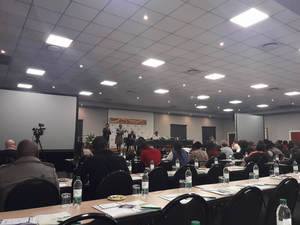Mighty Wings Life Centre
" In the shadow of your wings I will make my refuge, until these calamities have passed by"
Psalm 57.1
Mighty Wings Life Centre has always had the restoration of the entire family at the heart of recovery
 Presentation at International Day for Families - In Boksburg
Presentation at International Day for Families - In Boksburg
Carol Keyzer, CEO and co-founder of Mighty Wings Life Centre, was honoured to present Harm Reduction Strategies for Families of Addicted Individuals, on invitation by the Department of Social Development at the ‘International Day for families’- in Boksburg 30-31 May 2018.
In her presentation, she stated that the focus of rehabilitation has traditionally provided specialised treatment for addicted individual’s whereby the family members were limited to a supportive role at best, and were often completely in the dark about what recovery looked like and how this was supposed to play out in their homes. The minefield of addiction recovery is often too complicated and confusing for burnt-out family members to navigate and they are often oblivious to their own pain and dysfunctional coping due to years of living with an addicted family member. These are vulnerable families and often feel isolated and hide their suffering and pain.
Carol firmly believes that addiction recovery is for the entire family and that developing a culture of recovery within families and communities is the best method of transformation. These recovery centres need to be accessible for long-term recovery. They need to be affordable, and effective in transforming lives by providing fully comprehensive centralized outpatient services with professional and trained volunteer services.
The overwhelming increase of opioid and medicine addiction is a global problem that redefines the way we think about drug addicts. Due to the extensive need and exorbitant costs of treatment and the complexities of substances of abuse and other non-chemical addictions these comprehensive recovery centres are a refuge in the storm for many.
Research in the USA has shown a shift in treatment from focusing primarily on the addicted individual. The need to include families into treatment for their own healing is now being identified as not only beneficial to the recovery of the addicted individual but for the wellbeing of the entire family unit.
“The neglect of families effected by the opiod addiction ignores the damage such as addiction inflicts on the family, but it also fails to convey the very real possibility of long-term recovery, and offers no normative map to guide families into and through the recovery process”, White,W.L. & Daley,D.C. (2016)
When recovery is family-focused the benefits are compounded, and as stated by W.L. White (2017) “Family-focused addiction treatment and recovery support services generate recovery outcomes superior to treatment focused solely on the addicted individual. With support, families can achieve a level of health and functions superior to that which existed before the family was impacted by addiction. Addicted families and their families have the potential to get “better than well”.”
Mighty Wings offers one-of-a-kind, specialised family program, separate from the recovering addicts groups and free to family members except for the small cost of a seminar and four workbooks. These programs are facilitated by peer-facilitators and overseen by experienced social workers.
In her presentation, she stated that the focus of rehabilitation has traditionally provided specialised treatment for addicted individual’s whereby the family members were limited to a supportive role at best, and were often completely in the dark about what recovery looked like and how this was supposed to play out in their homes. The minefield of addiction recovery is often too complicated and confusing for burnt-out family members to navigate and they are often oblivious to their own pain and dysfunctional coping due to years of living with an addicted family member. These are vulnerable families and often feel isolated and hide their suffering and pain.
Carol firmly believes that addiction recovery is for the entire family and that developing a culture of recovery within families and communities is the best method of transformation. These recovery centres need to be accessible for long-term recovery. They need to be affordable, and effective in transforming lives by providing fully comprehensive centralized outpatient services with professional and trained volunteer services.
The overwhelming increase of opioid and medicine addiction is a global problem that redefines the way we think about drug addicts. Due to the extensive need and exorbitant costs of treatment and the complexities of substances of abuse and other non-chemical addictions these comprehensive recovery centres are a refuge in the storm for many.
Research in the USA has shown a shift in treatment from focusing primarily on the addicted individual. The need to include families into treatment for their own healing is now being identified as not only beneficial to the recovery of the addicted individual but for the wellbeing of the entire family unit.
“The neglect of families effected by the opiod addiction ignores the damage such as addiction inflicts on the family, but it also fails to convey the very real possibility of long-term recovery, and offers no normative map to guide families into and through the recovery process”, White,W.L. & Daley,D.C. (2016)
When recovery is family-focused the benefits are compounded, and as stated by W.L. White (2017) “Family-focused addiction treatment and recovery support services generate recovery outcomes superior to treatment focused solely on the addicted individual. With support, families can achieve a level of health and functions superior to that which existed before the family was impacted by addiction. Addicted families and their families have the potential to get “better than well”.”
Mighty Wings offers one-of-a-kind, specialised family program, separate from the recovering addicts groups and free to family members except for the small cost of a seminar and four workbooks. These programs are facilitated by peer-facilitators and overseen by experienced social workers.